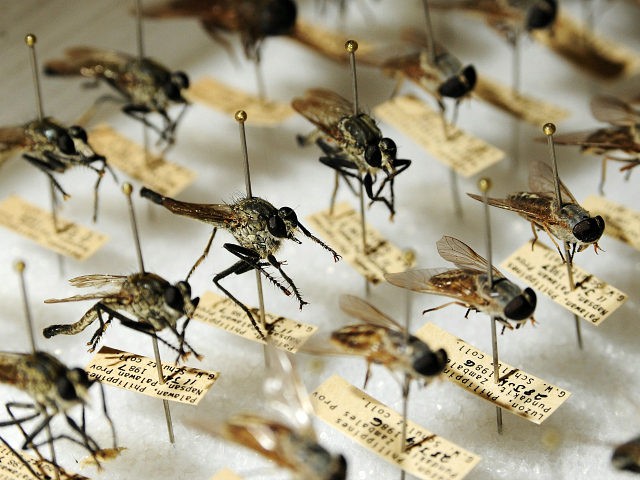If you believe the Guardian and the BBC, the world is on the brink of Insectapocalypse: A mass extinction of creepy crawlies that threatens the “collapse of nature.”
But if I were you, I’d take these claims with a big pinch of salt, especially if they include the words “climate change.” That is because the most dramatic, oft-quoted study that links insect loss with climate change turns out to be flawed to the point of uselessness. It is so bad that the Global Warming Policy Foundation has sent a formal complaint to its publishers calling for its withdrawal.
The study by Brad Lister and Andres Garcia was published last year by Proceedings of the National Academy of Sciences of the United States of America (PNAS). Titled Climate-driven declines in arthropod abundance restructure a rainforest food web, it appeared to tell a very worrying story about a precipitous decline in the number of insects in Puerto Rico’s Luquillo rainforest.
According to the study’s abstract, climate change is to blame:
From pole to pole, climate warming is disrupting the biosphere at an accelerating pace. Despite generally lower rates of warming in tropical habitats (1), a growing body of theory and data suggests that tropical ectotherms may be particularly vulnerable to climate change.
Climate change is killing insects in the rainforest because they don’t like it when it gets hotter?? Really???
Still, somehow it got past the peer review stage and, thence, straight into the pages of the left-wing media, which can’t get enough of these “planet is dying and it’s all our fault” stories.
“‘Hyperalarming’ study shows massive insect loss,” shrieked the Washington Post.
“Insects, biodiversity, and mass extinction: an alarming new study,” screeched Vox.
“Insect collapse: ‘We are destroying our life support systems,'” sobbed the Guardian.
Naturally, the study’s co-author Brad Lister had no problems ramping up the apocalyptic significance of his findings. He told the Guardian:
“We are essentially destroying the very life support systems that allow us to sustain our existence on the planet, along with all the other life on the planet,” Lister said. “It is just horrifying to watch us decimate the natural world like this.”
The story was eagerly recounted by one of the Guardian‘s resident eco-loons, Damian Carrington. Here is the bit that really should have sent Carrington’s alarm bells ringing:
Since Lister’s first visits to Luquillo, other scientists had predicted that tropical insects, having evolved in a very stable climate, would be much more sensitive to climate warming. “If you go a little bit past the thermal optimum for tropical insects, their fitness just plummets,” he said.
As the data came in, the predictions were confirmed in startling fashion. “The number of hot spells, temperatures above 29C, have increased tremendously,” he said. “It went from zero in the 1970s up to something like 44% of the days.” Factors important elsewhere in the world, such as destruction of habitat and pesticide use, could not explain the plummeting insect populations in Luquillo, which has long been a protected area.
Can environment journalists really be this stupid? When, exactly was this “very stable climate” in which insects evolved? And if they are really that hypersensitive, how come they survived all the previous periods of warming, such as the Minoan, Roman, and Medieval warming periods?
Anyway, as you’ll have guessed, the study’s authors had made a major boo-boo. Perhaps they were right about the insect population collapse. But they were completely wrong about it being caused by dramatically rising temperatures. That is because the data sets they used were compromised. The apparent dramatic increase in temperature was the result of a thermometer in the weather station being moved, not of “global warming.”
Had the authors visited the station’s website, they could have found this out for themselves:
We all make mistakes. Climate change researchers especially. But despite several articles pointing out the study’s error — including this by Paul Homewood and this at Watts Up With That? — the study is still being used as the basis of sundry scaremongering articles in the mainstream media.
It is referenced everywhere from this piece in the Guardian to this piece by Tim Stanley in the Telegraph.
But the study is bunk.
This is the problem with so much of what we’re told about “climate change.” The mainstream media’s insatiable appetite for global warming scare stories mean that any new study promoting the appropriate doomsday narrative is bigged up by environmental correspondents as yet further evidence that climate change is real. When the papers turn out to be flawed, though, no one is much interested in running the correction.
As my old Fleet Street colleagues used to say: “A big lie is halfway round the world before the truth has got his boots on.”
This is bad for public understanding of science; bad also for science itself. I am quite prepared to believe that there is a problem with declining insect populations, which we should do our best to address. But if, as in the case of this study, we are being fed the wrong information as to the cause of the loss, how are we supposed to get a proper sense of what needs to be done?



COMMENTS
Please let us know if you're having issues with commenting.